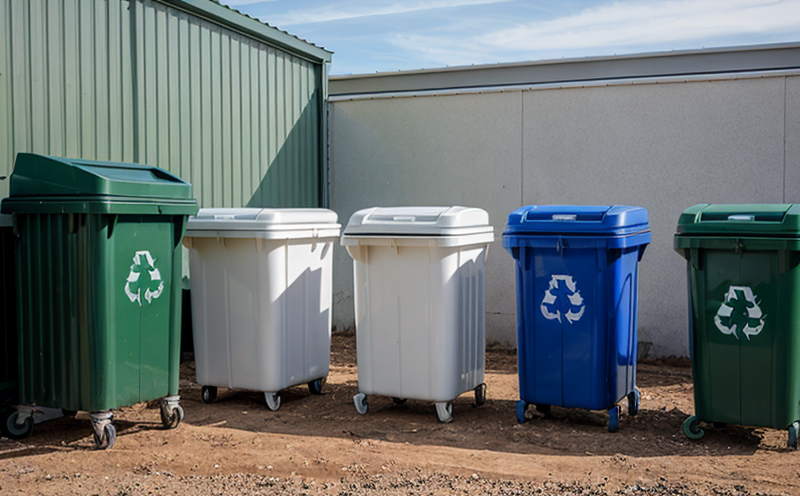ASTM D5511-20 Biogas Generation Test
The ASTM D5511-20 Biogas Generation Test is a crucial method used to evaluate the biodegradability of plastic materials, particularly those intended for packaging applications. This test assesses whether a given polymer can undergo anaerobic digestion under controlled conditions and produce methane gas (biogas), which indicates its potential to be recycled into valuable resources.
The process simulates the natural decomposition process that occurs in landfills but within a laboratory setting, providing more accurate data for material developers. This testing is essential for ensuring compliance with sustainability initiatives and recycling programs. By measuring biogas production, this test helps determine if a plastic can meet the stringent requirements set by international standards such as ASTM D5511-20.
Biodegradability is one of the key factors in determining a packaging material’s environmental impact. As society increasingly moves towards more sustainable practices, understanding how materials interact with waste streams becomes critical. The ASTM D5511-20 test provides insights into which plastics might have an extended lifespan in landfills or could be efficiently recycled.
The significance of this test cannot be overstated, especially considering the growing pressure on industries to reduce their carbon footprint and promote circular economies. By using biodegradable packaging materials, companies can mitigate adverse environmental impacts while still maintaining product integrity during transit. Additionally, successful completion of ASTM D5511-20 can open doors for market access in countries that have stringent regulations regarding waste management.
When selecting a testing partner for ASTM D5511-20 compliance, it's important to consider their expertise and experience in this specific area. Our laboratory offers state-of-the-art facilities equipped with the latest technologies necessary to conduct accurate tests according to ASTM standards. We ensure that all samples are handled carefully from receipt through analysis to reporting.
To prepare your sample for testing under ASTM D5511-20, please follow these steps:
- Ensure the sample is representative of the intended product.
- Cut or crush the sample into small pieces if necessary but avoid contamination.
- Place the prepared samples in appropriate containers suitable for biodegradation tests.
The testing procedure involves placing these samples into an anaerobic digestion chamber where they are incubated under controlled conditions over several weeks. During this time, microorganisms break down the material, producing biogas that can be measured and analyzed. The results provide detailed information about how quickly and effectively different materials decompose.
Our team of experienced professionals will guide you through every step of the process, ensuring accurate and reliable data collection. Once testing is complete, we deliver comprehensive reports outlining our findings along with recommendations for improvement where applicable. These insights are invaluable tools for R&D teams looking to innovate sustainable solutions or improve existing products.
By investing in ASTM D5511-20 compliance, businesses demonstrate their commitment to sustainability and responsible resource management. This not only enhances corporate reputation but also opens up new opportunities both domestically and internationally as markets demand greener alternatives.
Applied Standards
The ASTM D5511-20 Biogas Generation Test is based on the American Society for Testing and Materials (ASTM) standard that sets forth procedures for determining biodegradability of plastics under controlled laboratory conditions. This test method aims to assess the potential of a plastic material to undergo anaerobic digestion and release methane gas.
The ASTM D5511-20 procedure specifies several key parameters including temperature, humidity levels, microbial inoculum type and concentration, as well as incubation periods required for optimal results. These conditions are designed to mimic real-world scenarios found in landfills but within a more controlled environment where precise measurements can be made.
It's important to note that while ASTM D5511-20 focuses primarily on biodegradation rates, it does not measure compostability or other aspects of sustainability. For those seeking additional information about these areas, our laboratory also offers specialized testing services tailored specifically towards them.
Quality and Reliability Assurance
We understand the importance of accurate and reliable data when conducting ASTM D5511-20 Biogas Generation Tests. That's why we employ rigorous quality control measures at every stage of the testing process to ensure consistent results across all samples.
Our laboratory adheres strictly to ISO 9001:2015 certification standards which guarantee high-quality services and adherence to international best practices in our field. Our experienced staff uses advanced analytical instruments capable of detecting trace levels of biogas with precision, ensuring accurate readings even for small samples.
Before beginning any ASTM D5511-20 test, we perform thorough validation procedures on both the equipment used and personnel involved to maintain consistency in our results. This includes regular calibration checks and proficiency testing exercises conducted independently by external bodies recognized globally.
Data integrity is paramount when reporting findings from ASTM D5511-20 tests. Our reports are meticulously prepared using raw data collected during the test, along with visual aids like graphs or charts to illustrate trends clearly. Each report includes detailed explanations of methods used, assumptions made, and any limitations encountered throughout the process.
We also offer follow-up services such as retesting if initial results show variability or discrepancies that may require further investigation. This commitment to excellence ensures that clients receive trustworthy information they can rely upon for decision-making purposes related to their sustainability goals.
International Acceptance and Recognition
- United States: ASTM D5511-20 is widely accepted across various regulatory bodies within the U.S., including EPA, FDA, and OSHA. It plays a significant role in guiding policies related to waste management and recycling programs.
- European Union: While not officially recognized by EU directives, many member states incorporate ASTM D5511-20 into their national standards for biodegradable plastics.
- Australia: The Australian government references ASTM D5511-20 in its guidelines for waste management practices. Compliance with this standard can enhance your product's marketability there.
- Japan: Although not specifically mentioned in Japanese regulations, compliance with ASTM D5511-20 is often seen as an indicator of a company’s dedication to environmental stewardship.
The acceptance and recognition of ASTM D5511-20 extend beyond these regions due to its widespread use among academic institutions researching biodegradable polymers. Its credibility has been established through numerous peer-reviewed studies published in scientific journals worldwide.





